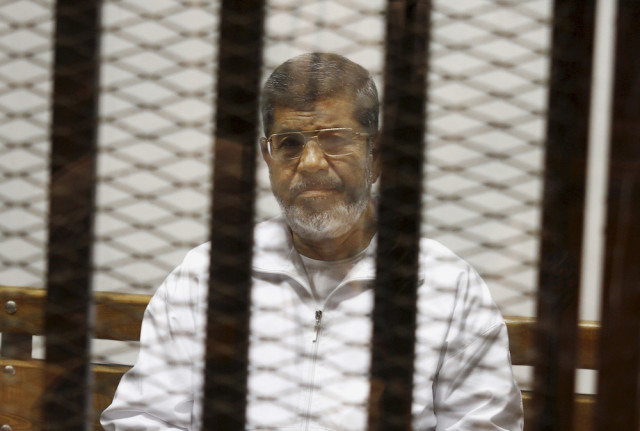As former Egyptian President Mohamed Morsi faces five different trials, some of the cases could lead to death penalty, according to experts.
“He will probably get death penalty for the charges that accompanied fleeing prison. When the judge recommends death penalty, it means he believes the defendant deserved the maximum penalty,” said Nasser Solaiman, a criminal law expert. “In the other case of espionage, it is normal to see death penalty. However it seems Morsi wasn’t directly involved, so he might get life in prison or lesser period for that.”
In April the former president was sentenced to 20 years in prison, for allegedly endorsing the attack on opposition protesters back in 2012, when at least nine were killed in the clashes.
On Saturday the judge from the Cairo Criminal Court rendered death penalty on charges of prison breaking for some defendants, including Morsi. In two other cases, the verdict was postponed to June 2.
Prosecutors have asked for the maximum penalty for Morsi, for allegedly leaking national defense and other top secrets documents to Qatar in his fourth court case, which is another possible death penalty.
The judicial authorities promise a fair trial for Morsi.
“Such crimes require extraordinary proceedings, but the state and its institutions refuse to take exceptional measures so as to absolve the state from the condemnation by the international community,” said Abdallahm Fathy, deputy chairman of the Judicial Club.
In all these trials, Morsi is still defiant to the court, and stresses that he’s still the president, therefore he should not stand before any regular criminal court.
Morsi’s supporters were furious with the ruling. Three prosecutors were killed in North Sinai after Morsi was sentenced to death by Cairo Criminal Court on charges of breaking out of prison, a crime which does not usually lead to the death penalty in Egypt.
Hours after the verdict, three courthouses were attacked across the country, with one of them torched. The interior ministry says it has raised its alert levels across the republic, but analysts expect more violence.
“I believe this verdict will cause cracks in the Egyptian state. The Brotherhood will escalate violence even more because that’s the first death penalty for Morsi. They will use all that is in their power. This is a war against the Egyptian state, a long war. They will continue targeting the army, the judiciary and the police,” said Tharwat Shalaby, a managing editor of Al Akhbar, a daily Arabic language newspaper published in Beirut.
However, some others hold different opinions.
Morsi was tried for espionage and breaking out of prison, and some legal experts were surprised that the death penalty was recommended for fleeing prison.
“Fleeing prison is a crime that leads to a lighter sentence. We had 23,740 prisoners who fled prisons in 2011. The maximum sentence they got was six months in prison because the law states that the penalty of this crime is one year at the most,” said Mohamed Abdelwahab, a civil rights lawyer.
But the defendants were also accused of breaking out, killing prisoners, stealing weapons and murdering security officers in a prison facility other than the one where they were jailed. The penalty for that could be death.
“I was expecting the death penalty in the espionage case, but not the fleeing from prison. In any way he still has another espionage case with Qatar. It’s a bigger trial and for that I expect he’ll get the death penalty. He and his group deserve to die,” said Ibrahim Senna, a Gharbiya resident in northern Egypt.
“I think the judge should have sentenced him to death directly instead of waiting for the Mufti. With that he’s given room for the prosecution and Morsi lawyers to appeal. Morsi will face the results of his acts, he has brought death to himself,” said Mohamed Fathy, a Qalyoubiya resident in southern Egypt.
Morsi might be getting death penalties soon, but they’re far from being implemented. So even if the state is in a rush, Morsi has the right to appeal once and twice in each case.
So even if the death penalties are upheld, which many legal experts doubt, they won’t be executed before an estimated two more years of trials.
Reuters wire reports
 CGTN America
CGTN America In this May 8, 2014 file photo, Egypt’s ousted Islamist President Mohammed Morsi sits in a defendant cage in the Police Academy courthouse in Cairo, Egypt. (AP Photo/Tarek el-Gabbas, File)
In this May 8, 2014 file photo, Egypt’s ousted Islamist President Mohammed Morsi sits in a defendant cage in the Police Academy courthouse in Cairo, Egypt. (AP Photo/Tarek el-Gabbas, File)
